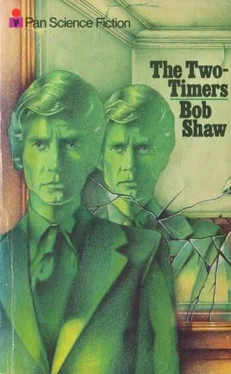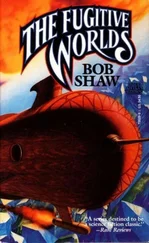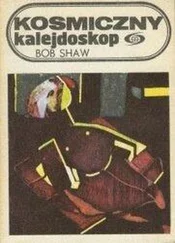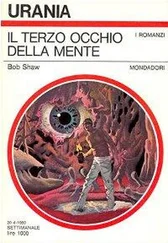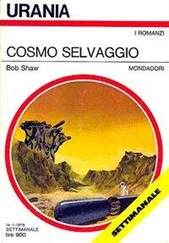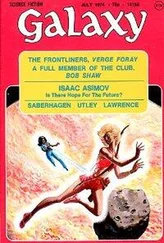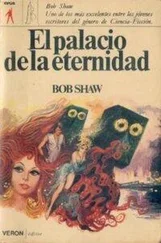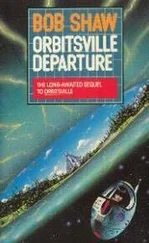Bob Shaw - The Two Timers
Здесь есть возможность читать онлайн «Bob Shaw - The Two Timers» весь текст электронной книги совершенно бесплатно (целиком полную версию без сокращений). В некоторых случаях можно слушать аудио, скачать через торрент в формате fb2 и присутствует краткое содержание. Год выпуска: 1971, Издательство: Pan SF, Жанр: Фантастика и фэнтези, на английском языке. Описание произведения, (предисловие) а так же отзывы посетителей доступны на портале библиотеки ЛибКат.
- Название:The Two Timers
- Автор:
- Издательство:Pan SF
- Жанр:
- Год:1971
- ISBN:нет данных
- Рейтинг книги:5 / 5. Голосов: 1
-
Избранное:Добавить в избранное
- Отзывы:
-
Ваша оценка:
- 100
- 1
- 2
- 3
- 4
- 5
The Two Timers: краткое содержание, описание и аннотация
Предлагаем к чтению аннотацию, описание, краткое содержание или предисловие (зависит от того, что написал сам автор книги «The Two Timers»). Если вы не нашли необходимую информацию о книге — напишите в комментариях, мы постараемся отыскать её.
THE TWO-TIMERS is his third novel, but the first to achieve maior publication.
The Two Timers — читать онлайн бесплатно полную книгу (весь текст) целиком
Ниже представлен текст книги, разбитый по страницам. Система сохранения места последней прочитанной страницы, позволяет с удобством читать онлайн бесплатно книгу «The Two Timers», без необходимости каждый раз заново искать на чём Вы остановились. Поставьте закладку, и сможете в любой момент перейти на страницу, на которой закончили чтение.
Интервал:
Закладка:
And all the time, Kate was walking away, and a voice was telling him he couldn’t let her go through the city at night looking as she did. He fought the same battle with his pride, then turned in the opposite direction, numbed with self-disgust, swearing bitterly…
A sense of aching vastness, shifting of perspectives and parallax, unthinkable transitions in which the curvatures of space-time writhe between negative and positive, and infinity yawns at the mid-point — numinous, illusory, poignant…
Breton gripped the arms of his chair and held on tightly until the sound of his breathing died away into the silence of the room. He got up, went to the fireplace and wound the old oak-cased clock. The heavy key was cool in his fingers, cool and real. Outside the windows the snow was coming down again in small, dry crumbs, and cars with their lights switched on early ghosted past beyond the trees. The house was filled with patient brown shadows.
He went into the kitchen and began to make coffee while his mind slowly released itself from the stasis induced by the trip. The ensuing lack of nervous energy was another familiar feature of the excursions into the past, but this time the drain had been greater than ever before. Waiting for the water to boil, Breton realized belatedly that the trip had been unusual in other respects — one of them being the introduction of an element of fantasy. Those elm trees growing in the middle of 14th Street had surprised him, but there was more to his sense of shock than an awareness of their incongruity. They had been semi-transparent, like images projected on a more vivid background, but that ragged archway was real. He had seen it somewhere, and it meant something — but what?
When the coffee had percolated, he opened the refrigerator and found there was no cream or milk. His stomach moved uneasily at the thought of black coffee, but a search of the depleted kitchen showed that the oniy other liquid available was in a pickle jar where several pieces of dill swam mistily like surgical specimens. Breton poured a cup of the black brew, flat gray spirals of vapor swirling close to its surface, and went back to the living room. He sat down, sipped some coffee, and tried vaguely to think about taking control of his personal affairs, but the room was growing dim and he felt tired. One week of treatment and rest had not been enough to repair the damage his extended binge had caused.
Breton awoke in near-darkness several hours later. A wan, violet-tinted light was filtering into the room from a street lamp, and tree shadows were moving uneasily on the innermost wall. Repressing a shiver and a surge of self-pity, Breton sat up and decided to go out to eat. As he was getting out of the chair he noticed the vacillating shadow of branches on the dead gray face of the television set — and he remembered where he had seen the three elms.
During a newscast one of the local channels had carried a still photograph of the spot where Kate’s body had been found — right by three elms.
The only trouble was that the elms he had seen on his trip had not been frozen to stillness by the camera. They had been moving… arranging and rearranging their black-etched limbs to the dictates of the night winds. They had been — Breton hesitated before applying the adjective — real. Its use meant there had been a shift in his attitude towards the trips, that some part of his mind had found it necessary to believe he had actually seen Kate that very afternoon. Could it be, Breton wondered coldly, that his lonely, guilt-ridden consciousness had defied every law in nature — to travel back through time? Suppose the age-old human desire to do the impossible, to go back into the past and correct mistakes, had been the psychic driving force behind all the trips he had ever made? That would explain why the recreated scenes were always crisis points, times when the course of his life had taken a disastrous turn. Could it be that he was a frustrated time traveler, anchored in the present by the immovable reality of his corporeal body, but managing to release some immaterial aspect of his identity to look back through time and hammer on the invisible walls of the past? If that was the case, then — God help him — he was going to relive that awful, final scene with Kate until he died. And the three elm trees had begun to loom…
I’ve got to get out of here, Breton thought, and find a good noisy diner with a juke box, checkered table cloths, huge vulgar plastic tomatoes on the tables, and normal human beings arguing about the things normal human beings argue about.
He put on lights all over the house, freshened himself up, changed his clothes and was going out through the front door when a slightly shabby sedan swung in the gateway and wallowed up the snow-covered drive. The passenger door opened and Hetty Calder got out, surveyed the snow with obvious disgust, and blew some cigarette ash onto it in a gesture of retaliation.
“Going out? Harry and I came over to see if there was anything we could do.”
“There is.” Breton was amazed at just how much pleasure the sight of her thick, tweedy figure was able to inspire in him. “You can be my guests at dinner. I’d be glad of your company.”
He got into the rear seat and exchanged brief greetings with Harry Calder, a balding, bookish man of about fifty. The clutter of shopping bags, scarves and magazines around him on the broad seat gave Breton a comforting feeling of being securely back in the world of uncomplicated normalcy, He studied the pre-Christmas store displays as they drove across the city, absorbing every detail, leaving no room for thoughts of Kate.
“How’re you feeling now, Jack?” Hetty peered back into Breton’s homely little kingdom. “You didn’t look too good when I dropped you off today.”
“Well, I wasn’t feeling too wonderful right then, but I’m fine now.”
“What was wrong?” Hetty persisted.
Breton hesitated, and decided to experiment with the truth. “As a matter of fact, I wasn’t seeing very well. Sort of colored lights had spread over most of my right eye.
Unexpectedly, Harry Calder turned his head and clucked sympathetically. “Prismatic, zigzag patterns, eh? So you’re another one?”
“Another one? What do you mean, Harry?”
“I get them too — and then the pain starts,” Harry Calder said. “It’s a common preliminary symptom of migraine.”
“Migraine!” Breton felt something heave convulsively in his subconscious. “But I never get headaches.”
“No? Then you must be one of the lucky ones — what I go through after those pretty colors start marching isn’t ordinary. You wouldn’t believe it.”
“I never knew there was any coiniection between that sort of thing and migraine,” Breton said. “As you say — I must be one of the lucky ones.”
Even to his own ears, his voice did not carry much conviction.
Breton’s belief in the possibility of time travel was born painfully, over a period of months.
He returned to his business, but found himself unable to make valid judgments on even the most clear-cut administrative issues, while technical decisions had receded to another plane of comprehension altogether. With the assistance of the three staff engineers, Hetty guided the consultancy into something approximating its normal channels of operation. At first, Breton sat at his desk staring at meaningless drawings for hours at a stretch, unable to think of anything but Kate and the part he had played in her death. There were times when he tried to write poetry, to crystallize and perhaps depersonalize his feeling about Kate. The heavy snows of the Montana winter buried the world in silence, and Breton watched it silt across the arrays of parked cars beyond his window. Its silence seemed to invade his own body so that he could hear its blind workings, the constant traffic of fluids, the subdividing incursions of air, the patient radial rain of cholesterol in his arteries…
Читать дальшеИнтервал:
Закладка:
Похожие книги на «The Two Timers»
Представляем Вашему вниманию похожие книги на «The Two Timers» списком для выбора. Мы отобрали схожую по названию и смыслу литературу в надежде предоставить читателям больше вариантов отыскать новые, интересные, ещё непрочитанные произведения.
Обсуждение, отзывы о книге «The Two Timers» и просто собственные мнения читателей. Оставьте ваши комментарии, напишите, что Вы думаете о произведении, его смысле или главных героях. Укажите что конкретно понравилось, а что нет, и почему Вы так считаете.
